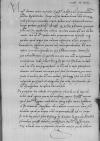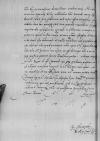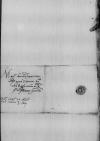Accepi abs te tandem binas litteras, utrasque certe plurimum iucundas, utpote quibus te mihi et sanum, et amicum longo quodam postliminio restituisti. Quod autem postremis (quas per ⌊fratrem⌋ misisti) expostulare videris, non tam mecum, quam cum omnibus amicis, cum ab illis, quibus adeo propinquiorem te fecisti, neque quidem, quod iniquus fers, ad tuas responsum ullum acceperis. Quam ob rem segniores fuerint alii ad respondendum, nihil mea refert. Cur non responderim, ipse hactenus accipe. Toties hic fuit annuntiatum, ⌊imperatorem⌋ iam iam omnino in ⌊Germaniam⌋ concessurum, unde subverebar, quod hi, qui se in ⌊Italiam⌋ contulerant, te illic non praevenissent, et litterae ad te missae potuissent devenire ad manus eorum, qui, ut sunt haec tempora, pro curiositate et malitia sua nihil non audent, factumque esset, ut et litterae resignatae perissent, et uterque nostrum suo voto frustraretur. Hic nihil est affictum, tu cetera boni consule.
De provisione tua retenta et in posterum solvenda ac de stipendio aulico quid egerim, paucis, sed verissime expono. Postquam cognovi apud ⌊maiestatem regiam⌋ constitutum esse, quod adhuc munia legationis in isto ⌊conventu⌋ Augustano obire debeas, curavi cum omni sollicitudine apud ⌊principes nostros⌋, ut, quemadmodum ad me scripsisti, voto tuo fieret satis. Effecique, ut ⌊maiestas reginalis⌋ committat solvendum, quicquid debetur, ex thesauro Barensi usque ad 1530-05-01⌊primam Maii1530-05-01⌋, abinde vero in sequentes singulos menses pendi debent illic tibi ex commissione domini ⌊Boner⌋ centum aurei. Ad rationem vero stipendii aulici mittuntur tibi ducenti aurei. Alii ducenti soluti sunt ⌊Fokkaris⌋ aut nescio quibus trapesitis. Pro reditu item tuo provisio fiet tum, quando revocaberis. In quibus impetrandis quid fecerim ego, nolo in praesentiarum recensere, ne putes me apud te istis neniis venari gratiam, quandoquidem et tua merita tanti esse deberent, ut nullo monitore aut precatore opus esse debeat tibi apud ⌊principes⌋ nostros, quos etsi sapientes atque liberales, tamen homines non nescis. Si quid deinceps tibi a me obsequii praestari poterit, secure committere potes. Reliqua accipies ex litteris reverendissimi domini ⌊episcopi Cracoviensis⌋, qui ex cardiaca passione iam ab aliquot mensibus languet, te tamen diligere non cessat.
Vale, mi Dantisce, et me, quod facis, ama vel reama potius.
Datae ⌊Cracoviae⌋, XXVI-a Aprilis, in discessu hinc serenissimorum ⌊principum⌋ nostrorum, qui voti persolvendi gratia in ⌊Cząnstochowam⌋ concedunt.
Anno Domini M-o D-o XXX-o.


